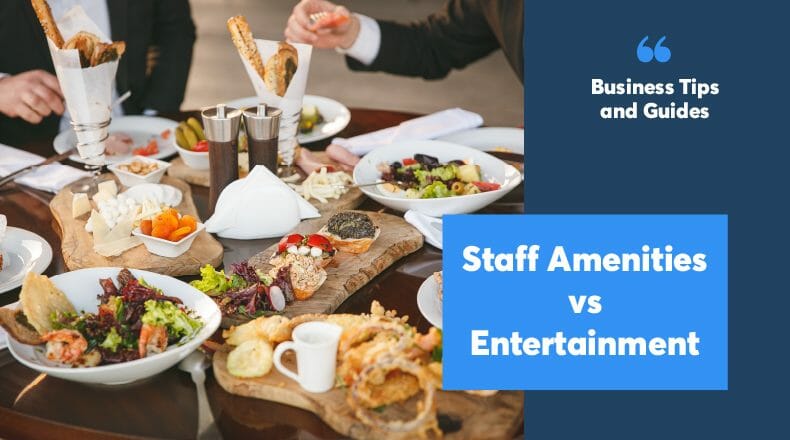If you were lucky enough to be working in the 80’s and 90’s, you may have enjoyed many a ‘business expensed’ boozy lunch with clients or staff members. And while those days are not gone for good, the rules, like the hairstyles of the era, have moved on. Today, as a business owner, it’s likely that from time to time you’ll provide your employees with such items as food and drink, and perhaps even gifts. However, it’s important to know whether the items you are providing to them are classed as staff amenities or entertainment, as each are treated differently by the ATO.
Staff amenities vs entertainment
According to the ATO, the provision of things such as morning tea to employees (and associates of employees) during the working day is not classed as entertainment, but a staff amenity and in most cases, is deductible.
Morning and afternoon tea includes light refreshments such as tea, coffee, fruit drinks, cakes, and biscuits etc, but does not (unfortunately) include alcohol. Light meals are treated in the same way as morning and afternoon teas and all are an allowable deduction (classed as an exempt fringe benefit).
However, as “light” meals become more elaborate, they take on the characteristics of entertainment, and as such need to treated differently. Some examples of providing entertainment can be seen as:
- Staff social functions such as parties
- Christmas parties
- Birthday parties
- Farewell functions
- Anniversary dinners
- Celebrations for achieving sales targets
- Business lunches with clients
- Product release functions
- Golf days
- Gym memberships
- Sporting club memberships
- Reward and recognition functions.
If you sometimes provide one or more of the above to your staff and classify the activity as entertainment, you may be required to pay fringe benefits tax (FBT).
Determining whether its staff amenities or entertainment?
Let’s look at one of the most common examples – food and drink.
In order to determine when food or drink provided to a person results in entertainment, you need to examine the circumstances surrounding that provision of the food or drink. None of the following factors on their own will determine if the food or drink provided is entertainment. However, (a) and (b) are considered the more important factors.
(a) Why is the food or drink being provided?
This is a purpose test. For example, food or drink provided for the purposes of refreshment does not generally have the character of entertainment, whereas food or drink provided in a social situation where the purpose of the function is for employees to enjoy themselves has the character of entertainment.
(b) What food or drink is being provided?
Morning and afternoon teas and light meals are generally not considered to be entertainment. However, as light meals become more elaborate, they take on more of the characteristics of entertainment. The reason for this is that the more elaborate a meal, the more likely it is that entertainment arises from consuming the meal.
(c) When is the food or drink being provided?
Food or drink provided during work time, during overtime or while an employee is travelling is less likely to be entertainment. This is because, in the majority of these cases, food provided is for a work-related purpose rather than an entertainment purpose. This, however, depends on whether the entertainment of the person is the expected outcome of the food or drink. For example, a staff social function held during work time still has the character of entertainment.
(d) Where is the food or drink being provided?
Food or drink provided on the employer’s business premises or at the usual place of work of the employee is less likely to have the character of entertainment. However, food or drink provided in a function room, hotel, or restaurant etc, or consumed with other forms of entertainment is more likely to have the character of entertainment. This is because the provision of food or drink is less likely to have a work-related purpose.
A quick note about Fringe Benefits Tax (FBT)
FBT is a tax that employers pay on benefits paid to an employee (or their associate, such as a family member) in addition to their salary or wages. FBT is calculated on the taxable value of the benefits you provide. This is separate to income tax.
If you provide fringe benefits to your employees, the Australian Taxation Office (ATO) recommends you register for FBT.
Examples and classifications
| Example | FBT applies? | Income Tax Deductible | Input Tax Credits | Minor Benefit Exemption |
|---|---|---|---|---|
| Employee amenities at business premise – tea, coffee, water, vending machine food | No | Yes | Yes | Not applicable |
| Light meals and refreshments at business premise in connection to meetings, trainings, over time | No | Yes | Yes | Not applicable |
| Business meals at restaurants/similar venues (outside of business premise) provided to employees | Yes | Yes | Yes | Yes |
| Business meals at restaurants/similar venues (outside of business premise) provided to clients & suppliers | No | No | No | Not applicable |
| Basic sustenance meals consumed by employees on overnight business travels | No | Yes | Yes | Not applicable |
| Gifts, voucher cards, hampers provided to employees | Yes | Yes | Yes | Yes |
Pitfalls to avoid with staff amenities
An issue we see quite regularly is businesses claiming their entertainment expenses (for which no GST credits can be claimed and for which Fringe Benefit Tax may be due) as staff amenities expenses (for which GST and other deductions can be claimed).
The ATO class these two categories quite differently so remember to make sure your classifications are right. If you need advice or assistance categorising your business expenses don’t hesitate to contact us!
A quick checklist
If you are thinking of providing food and drink or recreation to employees, follow the below to make sure you stay on track:
- Determine whether the food, drink or recreation is a staff amenity or entertainment.
- Consider if an exemption applies
- Decide if you can reduce your FBT payable on the food, drink, or recreation
- Keep the appropriate records
- Calculate your FBT liability
- If required, report an amount on the employee’s payment summary
Get expert accounting advice
While providing staff amenities is a great way to reward and retain staff there are potential tax implications. If you need help, the team at POP Business can provide expert advice on this area and much more. Call us today to find out more.


